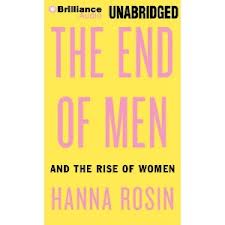 Tired of the hot cross-accusations and name-calling around presidential campaign politics?
Tired of the hot cross-accusations and name-calling around presidential campaign politics? 
Then why not jump into another hot skirmish: what’s happening between men and women? It’s already getting heated in advance of the launch of Hanna Rosin’s The End of Men and the Rise of Women. No surprise with that provocative title.
Here are some conversation starters, excerpts from her book that range from changing roles in careers, bed, family, violent activity and civic life — and surprising shifts re desire for marriage or children. The following excerpts book excerpts are direct quotes yet the section headlines are mine…
While Women Increasingly Self-Describe Using Traditional Masculine Traits, Men…
• “The Bem test is the standard psychological tools used to rate people on how strongly they conform to a variety of measures considered stereotypically male or female: self-reliant, yielding, helpful, ambitious, tender, dominant. Since the test started being administered in the mid-1970s, women have been encroaching into what the test rates as male territory, defining themselves as assertive, independent, willing to take a stand.
 A typical Bem woman these days is compassionate and self-sufficient, individualistic and adaptable. Men, however, have not met them half-way, and are hardly more likely to define themselves as tender or gentle than they were in 1974. In fact, by some measures men have been retreating into an ever-narrower space, backing away from what were traditionally feminine traits as women take over more masculine ones.
A typical Bem woman these days is compassionate and self-sufficient, individualistic and adaptable. Men, however, have not met them half-way, and are hardly more likely to define themselves as tender or gentle than they were in 1974. In fact, by some measures men have been retreating into an ever-narrower space, backing away from what were traditionally feminine traits as women take over more masculine ones.
• In a 2000 review of fifty years of literature, Roy Baumeister concludes…Male sexuality is “relatively constant and unchanging” which suggests it is ruled by factors that are “rigid” and more “innate.” Female sexuality, by contrast, is ‘malleable and mutable: It is responsive to culture, learning, and social circumstances.”
• Excellent studies, from dozens of countries, show that married men are happier, healthier, and live longer than their single counterparts. (Also, contrary to the bachelor myth, they report more sexual satisfaction.)
Women are Passing Men in Work Advancement
• While men still wear the pants in the economy yet “the story was no longer about the depths men had sunk to; that dynamic had been playing out for several decades and was more or less played out. The new story was that women, for the first time in history, had in many ways surpassed them.”
“the single most destructive social force of our era”
• “Fifty years ago, thirty years ago, if you were one of the fairly constant fraction of boys who wasn’t ready to learn in high school, there were ways for you to enter the mainstream economy,” says Henry Farber, an economist at Princeton. “When you woke up, there were jobs. There were good industrial jobs, so you could have a good industrial, blue-collar career. Now those jobs are gone.”
• Lately economists have begun to focus on the lack of wage opportunities for men as “the single most destructive social force of our era,” says Michael Greenstone, an MIT economist on the White House Council of Economic Advisers for President Barack Obama. David Brooks memorably defined this problem as “the missing fifth,” referencing the percentage of men – most of them without a college diploma – who are not getting up and going to work.
In 1950 roughly one in twenty men of prime working age was not working; today that ratio is about one in five, the highest ever recorded.
“The real issue here is not the end of men, but the disappearance of manhood.”
• The First Baptist Church in Alexander City is a thriving community, with packed pews every Wednesday and Sunday and community events nearly every day of the week. But as with most evangelical churches, the changes in gender relations have forced a rethinking of a basic philosophy. As Albert Mohler, president of the Southern Baptist Theological Seminary, recently asked, “What does it mean for large sectors of our society to become virtual matriarchies? How do we prepare the church to deal with such a world while maintaining biblical models of manhood and womanbood.”
Christians, he warned, “had better know that matters far more important than economics are at stake. These trends represent nothing less than a collapse of male responsibility, leadership, and expectations. The real issue here is not the end of men, but the disappearance of manhood.” 
See the rest of my “Connected and Quotable” column over at Forbes in the Leadership section.


